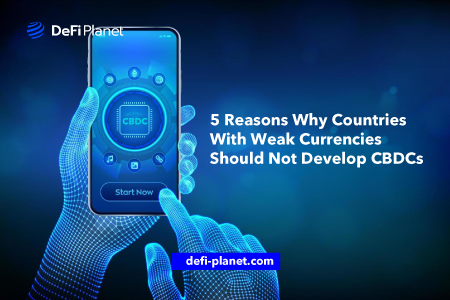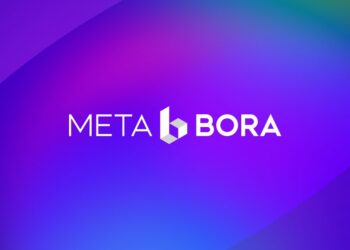Last updated on November 17th, 2022 at 12:46 pm
Central Bank Digital Currencies (CBDCs) have recently become a hotly debated topic. Various countries are researching and experimenting with creating their own CBDC, while some have already floated their digital currency.
For example, Nigeria launched its CBDC, e-Naira, in 2021, making it one of the first countries to successfully float its digital currency. The primary goal of the eNaira is to improve financial inclusion for the unbanked members of society.
This opinion piece explains why countries with weak currencies should not establish their own CBDC.
What is a CBDC?
A Central Bank Digital Currency (CBDC) is the digital representation of a fiat currency. It is issued by a government to represent the digital token of their official currency. This type of virtual token differs from cryptocurrencies in that they are issued by the government, regulated by it, and may not be as transparent as cryptocurrencies.
As a result, privacy may be compromised with CBDCs, as seen with Nigeria’s e-Naira, which requires potential users to provide their bank verification number (BVN) before signing up for the e-Naira wallet.
Various governments may use CBDCs to influence their economic policies. Residents of a country are more likely to trust CBDCs because they, like cash, are issued by the government. Several countries are developing CBDCs, but only a few have released a working prototype.
What Are the Benefits of CBDCs?
Before discussing why countries with weak currencies should not establish a CBDC, it is only fitting to discuss the benefits of CBDC.
Users of CBDCs benefit from some features, some of which include:
Eco-friendly currency
Paper and coins are the traditional forms of fiat currency. The issuance of traditional fiat currencies is recurring, which means that the country’s central bank is expected to issue new paper money and coins regularly.
Coins are known to last longer than paper currency. This means that paper money must be created and discarded regularly, depleting environmental resources.
Because central bank digital currencies are digital, they are perceived to be more environmentally friendly than paper money.
CBDCs are not printed as paper or coins and are stored in an electronic wallet.
A bridge between the Central Bank and the populace
CBDCs enable a country’s central bank to establish contact with its citizens. It lowers the cost of infrastructure required to provide financial services to the unbanked.
Efficient Distribution of Benefits
Through CBDCS, governments can easily distribute benefits and incentives to their citizens. Instead of dealing with the bottlenecks associated with using commercial banks, the government can send benefits such as unemployment benefits, grants, and aid to eligible residents via CBDC.
Curbing illegal activities
Several articles and reports have been published about the possibility of using cryptocurrencies for illegal activities due to their anonymity feature (i.e., they pose similar risks to cash). Governments can use CBDCs to track their citizens’ financial activities.
Why Should Countries With Weak Currencies Avoid Creating CBDCs?
Countries with weak currencies, such as Nigeria, have no logical reason to create a digital version of their fiat currency, the CBDC.
For example, Nigeria’s fiat currency, the naira, is currently falling rapidly against the US dollar. As of July 27, 2022, the naira’s value against the dollar was 710.
People have compared the rapid depreciation of the naira to what is happening in Venezuela. Economic policies aimed at halting the decline appear ineffective.
The Central Bank of Venezuela has disclosed that they intend to launch its CBDC by October 2022 and will most likely remove six zeros from the currency. The latter may have a greater impact on Venezuela’s fiat currency than establishing a CBDC, but only time will tell.
Because Nigeria is heavily import-dependent, the rapid and continuous depreciation of the naira has resulted in high inflation and increased insecurity in the country.
Below are some reasons why we believe countries with weak currencies and economic situations, such as Nigeria, do not need to establish CBDCs.
Crypto preference
Statistics show that Nigerians prefer cryptocurrencies, particularly stablecoins, to CBDCs. As a result of the naira’s constant depreciation, some residents have lost faith in the fiat currency’s role as a store of value. Consequently, many Nigerians have converted their naira into cryptocurrencies, particularly stablecoins.
One would have thought that residents would have been discouraged from using stablecoins since the Central Bank of Nigeria (CBN) banned banks from allowing their infrastructure to be used for cryptocurrencies, but this is not the case.
As part of the ban, the Central Bank directed banks to close the accounts of anyone who uses banking infrastructure to engage in crypto-related activities.
The CBN’s crypto ban does not make cryptocurrency illegal in the country; instead, it makes it impossible for residents to buy cryptocurrencies with their bank cards or receive money from crypto exchanges and other crypto firms.
Popular cryptocurrency exchanges, including Binance, created a Peer-to-Peer (P2P) service for naira transactions, allowing Nigerians to purchase cryptocurrencies with naira from other users on the exchange. Binance announced the addition of an “NGN FIAT/NGN pair to its Peer to Peer (P2P) trading platform in Nigeria.”
After the ban, the CBN fined some commercial banks for allowing customers to use their banking facilities for cryptocurrency activities.
Stanbic Bank received a N200 million fine, while Access Bank received a N500 million fine.
Fidelity Bank was fined N14.3 million, while UBA was fined N100 million.
Even after the ban and the establishment of the CBDC, Nigerians have continued to favor cryptocurrencies, particularly stablecoins.
According to statistics from Gemini’s Global State of the Crypto Report, 26% of Nigerians own at least one crypto asset.
63% of Nigerians view crypto as the future of money, and 44% of those who do not own any crypto assets are willing to purchase them.
In Nigeria, the crypto rate in relation to the naira is now regarded as a new form of the exchange rate. The preference for cryptocurrency over e-Naira has led Nigerians to consider the exchange rate of the naira to a stablecoin such as USDT as more appropriate than the official rate quoted by the Central Bank of Nigeria.
The President of the Association of Bureau de Change Operators of Nigeria, Aminu Gwadabe, spoke to Bloomberg about the impact of the cryptocurrency rate on the naira.
“More people are buying cryptocurrencies because they are losing confidence in the naira. The USD rate on the crypto floor is used in determining the value of the local currency. ”
Lack of trust
Using the e-Naira as an example, most Nigerians are skeptical of the CBN releasing a CBDC. Over time, residents’ trust in their fiat currencies has dwindled drastically, especially since the value of the naira has continued to fall. Nigerians in the crypto space have continued to steer clear of the e-Naira, as have non-crypto enthusiasts.
A CBDC reflects the current state of the fiat currency, whether good or bad. CBDCs are the digital equivalents of fiat currency, which means they have the same monetary value. This implies that one e-Naira is equal to one naira. Because both are interchangeable, it makes no difference whether a Nigerian chooses to hold the e-Naira or the naira note.
The e-Naira CBDC does not insulate Nigerians from the harsh economic effects of the naira’s rapid depreciation. The average Nigerian sees no benefit in holding the e-Naira because the fiat currency continues to depreciate.
Poor User Experience
The e-Naira was promoted as a tool for banking the unbanked members of the community. To accomplish this, one would expect the process of creating an e-Naira wallet to be seamless, but this was not the case.
The e-Naira wallet requests that potential users register with their Bank Verification Number (BVN).
A BVN can only be obtained from a bank, meaning that unbanked Nigerians must go to a bank and open an account with a valid ID to get the BVN needed to access the e-Naira wallet. This essentially undermines the goal of banking the unbanked.
In the case of cryptocurrencies, anyone can buy them without registering an account, especially if they use peer-to-peer (P2P) services or other types of decentralized exchanges.
In Conclusion,
- A Central Bank Digital Currency (CBDC) is the digital form of a fiat currency. It is issued by a government to represent the digital token of their official currency.
- Nigeria’s CBDC is the e-Naira.
- Nigeria’s official currency, the naira, which serves as the underlying fiat currency for the e-Naira CBDC, is relatively weak, with recent unprecedented declines leading to high inflation and economic challenges.
- There is widespread skepticism toward the e-Naira.
- Countries with weak currencies do not require CBDCs because they are simply creating a representation of their devalued fiat currencies, which has no economic impact and does not improve financial inclusion.
- The e-Naira has had a low adoption rate since its inception.
If you would like to read more articles like this, visit DeFi Planet and follow us on Twitter, LinkedIn, Facebook, and Instagram.
“Take control of your crypto portfolio with MARKETS PRO, DeFi Planet’s suite of analytics tools.”





















